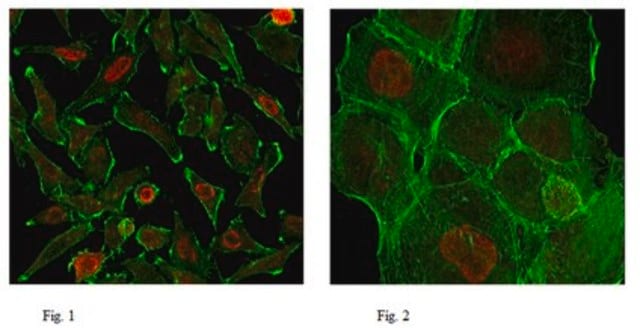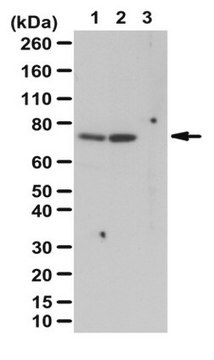05-802R
Anti-phospho-Akt (Thr308) Antibody, clone 50-1C-25, rabbit monoclonal
clone NL50, Upstate®, from rabbit
Synonym(s):
Protein kinase B, RAC-alpha serine/threonine-protein kinase, murine thymoma viral (v-akt) oncogene homolog-1, rac protein kinase alpha, v-akt murine thymoma viral oncogene homolog 1
About This Item
Recommended Products
biological source
rabbit
Quality Level
antibody form
purified antibody
antibody product type
primary antibodies
clone
NL50, monoclonal
species reactivity
human, bovine, mouse, rabbit, chicken
manufacturer/tradename
Upstate®
technique(s)
ELISA: suitable
immunocytochemistry: suitable
immunofluorescence: suitable
western blot: suitable
isotype
IgG
NCBI accession no.
UniProt accession no.
shipped in
wet ice
target post-translational modification
phosphorylation (pThr308)
Gene Information
bovine ... Akt1(280991)
human ... AKT1(207)
General description
Specificity
Immunogen
Application
Signaling
PI3K, Akt, & mTOR Signaling
This lot detected Akt when phosphorylated on Thr308 at 1:1,000 dilution in PDGF-treated NIH/3T3 lysates via SDS-PAGE and transferred to PVDF (Immobilon-P).
Quality
Target description
Linkage
Physical form
Storage and Stability
Handling Recommendations: Upon receipt, and prior to removing the cap, centrifuge the vial and gently mix the solution. Avoid repeated freeze/thaw cycles, which may damage IgG and affect product performance.
Legal Information
Disclaimer
Not finding the right product?
Try our Product Selector Tool.
Storage Class Code
12 - Non Combustible Liquids
WGK
WGK 1
Flash Point(F)
Not applicable
Flash Point(C)
Not applicable
Certificates of Analysis (COA)
Search for Certificates of Analysis (COA) by entering the products Lot/Batch Number. Lot and Batch Numbers can be found on a product’s label following the words ‘Lot’ or ‘Batch’.
Already Own This Product?
Find documentation for the products that you have recently purchased in the Document Library.
Our team of scientists has experience in all areas of research including Life Science, Material Science, Chemical Synthesis, Chromatography, Analytical and many others.
Contact Technical Service








